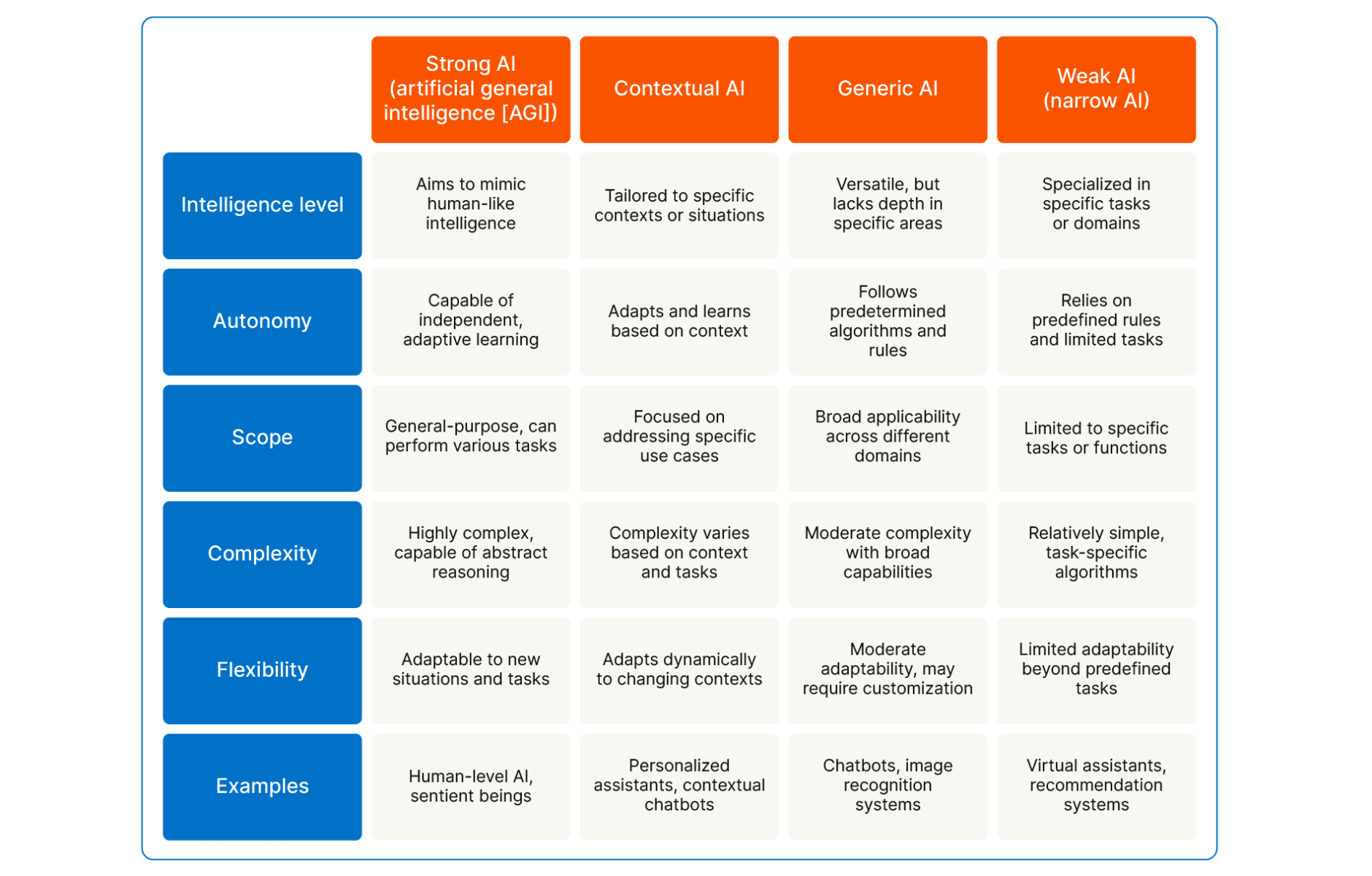Understanding artificial intelligence (AI)
AI is a crucial driver for mission-critical operations, allowing organizations to automate processes, gain insights from data and enhance customer experiences.
AI is a crucial driver for mission-critical operations, allowing organizations to automate processes, gain insights from data and enhance customer experiences.

In its simplest form, AI is a smart computer system that can do things that usually need human thinking. It's the driving force behind virtual assistants scheduling our appointments, the algorithms predicting our next Netflix binge and the autonomous vehicles navigating our streets.
AI is shaping our future in ways we're only starting to understand, making life easier and arguably more efficient. But what exactly is AI, and why does it matter for businesses today? Let's dive in and explore the world of AI, its applications and the incredible future we can look forward to with this technology.
Artificial intelligence (AI) involves developing computer systems that perform tasks typically requiring human intelligence, including understanding language, recognizing patterns, learning and making decisions. Despite significant advancements in recent years, AI has been a field of study and a technological tool for decades, with its roots tracing back to the mid-20th century.
Today, AI is used to craft systems and technologies that perceive, reason and act to achieve specific goals. It encompasses machine learning (ML), natural language processing (NLP), computer vision and generative AI.
AI systems can be categorized into narrow AI, which focuses on specific tasks, and general AI, which aims to replicate human-like intelligence across a wide range of activities. From virtual assistants to self-driving cars, AI technologies are increasingly integrated into our daily lives, transforming industries and driving innovation in ways previously unimagined.

Explore how modern content services platforms unlock content intelligence to streamline workflows, strengthen governance and drive better business outcomes. Get practical insights on AI readiness, content intelligence adoption and workforce transition strategies.
AI works using algorithms and computational models that enable machines to learn from data, recognize patterns and make decisions or predictions. At the heart of many AI systems is ML, a subset of AI that focuses on training algorithms to improve their performance on a specific task over time.
ML techniques such as supervised learning (SL), unsupervised learning (UL) and reinforcement learning (RL) are used to train models on large datasets, allowing them to identify patterns and relationships within the data. These models are then deployed to perform tasks such as image recognition, language translation or predictive analytics.
Additionally, AI systems often leverage techniques from fields such as statistics, optimization and computational neuroscience to simulate human-like intelligence. NLP algorithms enable machines to understand and generate human language while computer vision algorithms enable machines to interpret and analyze visual information.
Generative AI, another subset of artificial intelligence, produces responses to questions or prompts using the dataset it has been trained on. It can retrieve information from repositories and external sources, enabling various use cases such as text summarization, image and text generation, image enhancement and virtual assistance.
With a significant increase in interest in generative AI, it promises to revolutionize how we interact with data and information, opening up new possibilities for innovation and creativity.
It's essential to distinguish between various types of AI systems. Below, we compare the characteristics of strong AI, weak AI, generic AI and contextual AI to shed light on their unique features and applications:

AI offers operational efficiency and accuracy beyond the status quo. These are some of the benefits it offers:
The ability of AI to automate repetitive tasks frees up employees to focus on higher level tasks. Document processing tools leverage AI to intelligently classify documents and extract data from content.
By streamlining workflows and reducing manual intervention, AI enables organizations to accomplish tasks faster and with greater accuracy.
AI utilizes progressive learning algorithms to analyze data and identify patterns, allowing for more accurate predictions and relevant recommendations. This means AI can anticipate user needs and preferences to provide personalized recommendations in real time.
Such tailored experiences improve user convenience and streamline interaction, enhancing engagement and satisfaction.
Organizations that leverage AI insights gain a competitive advantage with data-driven decisions and optimized processes. It enables businesses to identify opportunities, anticipate market trends and adapt quickly to changing conditions.
Staying ahead of the digital curve allow companies to differentiate themselves in the marketplace and maintain their position as industry leaders.
By operating continuously, AI systems ensure consistent availability and performance without the need for breaks or downtime. This reliability enables organizations to deliver consistent service levels and meet customer expectations around the clock.
Whether it's handling customer inquiries or monitoring critical systems, AI guarantees uninterrupted operations and responsiveness.
AI-powered CX solutions can provide customers with the personalized guidance and support that they need to address problems effectively. Chatbots, virtual assistants and recommendation engines use AI to understand and respond to customer inquiries.
The timely assistance being offered enhances the overall customer experience and reduces the burden on human customer service representatives.
Organizations augmenting automation efforts with AI
Predict AI-enabled automation will soon be a big impact
Using IA to automate manual processes and extract insights
AI’s capabilities are always increasing, and it's become evident how this technology can radically change operations of organizations across different sectors. These are a few examples of how AI solves everyday challenges:
In the financial sector, AI revolutionizes data management by facilitating real-time fraud detection to minimize false positives and expedite investigations for swift customer resolutions.
For instance, predictive analytics can pre-empt fraudulent transactions, reducing the need for repetitive screenings and streamlining response protocols.
Healthcare professionals leverage AI to enhance health outcomes and patient experiences in many ways, including analyzing scans and detecting abnormalities that a human eye may miss.
Additionally, AI acts as a reliable assistant, alerting medical teams to potential diseases among critical care patients, thereby optimizing response times and treatment plans.
To ensure information accuracy, AI fact-checks and filters false sources, creating trust in media and entertainment consumption.
Moreover, AI facilitates efficient content creation by providing live captions for broadcasts and videos, empowering journalists and content creators to deliver timely and accessible content to diverse audiences.
AI-driven insights enable retail businesses to personalize customer experiences, optimize inventory management and streamline supply chain operations.
By analyzing vast datasets, AI algorithms can potentially predict consumer preferences, anticipate demand fluctuations and recommend tailored product offerings, thereby enhancing customer satisfaction and driving revenue growth.
In manufacturing and production environments, AI-driven automation enhances operational efficiency, quality control and predictive maintenance.
These companies integrate AI-powered predictive analytics and ML algorithms to optimize production processes, minimize downtime and proactively address equipment failures, thereby maximizing productivity and reducing costs.
Learning platforms powered by AI analyze student performance data to tailor instructional materials and interventions, catering to individual learning styles and abilities.
The ability to personalize learning experiences helps foster student engagement and self-directed learning.
> Read more | The role of AI in transforming higher education
AI-driven precision agriculture solutions optimize resource utilization, crop management and yield prediction.
By integrating sensor data, satellite imagery and weather forecasts, AI algorithms can provide farmers with actionable insights to make informed decisions about planting, thereby increasing crop productivity and sustainability.
Within transportation and logistics, AI technologies enhance route optimization, fleet management and predictive maintenance of vehicles.
By analyzing real-time traffic data, weather conditions and the likelihood of equipment failures, AI algorithms can optimize delivery schedules and minimize service disruptions.
AI can play a crucial role in monitoring and protecting ecosystems, biodiversity and natural resources.
By providing actionable insights using satellite imagery, AI empowers conservationists and policymakers to make informed decisions and implement targeted interventions for sustainable resource management.
For cybersecurity, AI technologies enhance threat detection and incident response by analyzing network traffic and user behavior.
By leveraging ML algorithms, AI systems adapt to evolving threats, improving detection accuracy and reducing response times to mitigate cyber risks effectively.
> Read more | AI in the workplace
The significance of data and content in an AI strategy cannot be overstated. Organizations rely on high volumes of quality data and content to effectively implement and train AI models.
These elements are inherently intertwined, as the success of AI initiatives depend on the availability of diverse and rich datasets. With data serving as the fuel and content as the context, they go hand in hand, driving innovation and insights across diverse sectors.
The promise of AI in content management is in its ability to revolutionize every stage of the content lifecycle, from creation and curation to distribution and optimization. This extends far beyond mere automation, it lies in the potential of AI-powered systems to transform how organizations handle information, make decisions and enhance both customer and employee experiences.
The ability to accelerate the speed of business operations by analyzing vast volumes of data, extract valuable insights and derive actionable intelligence enables businesses to make informed decisions in real-time. As a result, AI empowers organizations to operate with agility and efficiency, gaining a competitive edge in today's dynamic marketplace.
It doesn’t end there. With AI, the quality of decision-making in the workplace improves. These systems learn from user interactions and continuously improve over time, resulting in streamlined workflows and higher productivity rates across the organization.
Of course, we can’t forget about the customer experience. With AI-driven personalization and recommendation engines, organizations can deliver hyper-targeted content and recommendations tailored to individual preferences and needs. This type of capability keeps customers satisfied and brings a sense of loyalty towards your organization.
All in all, by harnessing the power of AI, organizations can unlock new levels of efficiency, effectiveness and innovation in managing and leveraging their content to drive business growth in the ever-evolving digital age.
It's important to recognize that AI is not here to replace human capabilities, but rather to augment and enhance them. Our vision is to achieve a level of supervised autonomy, where intelligent systems revolutionize processes and decision-making, driving operational efficiency through a combination of autonomous processes and human-guided supervision.
By embracing AI as a partner in our journey, we can unlock new levels of innovation, productivity and effectiveness, ultimately shaping a future where humans and machines collaborate seamlessly to achieve our goals.
However, the future of AI is not without its challenges. Ethical considerations, privacy concerns and the need for responsible AI governance will shape the evolution of AI technologies and their impacts on society. As users, benefactors and perhaps developers of transformative force, it falls on us to ensure AI is developed and deployed in a manner that prioritizes human values, diversity and inclusivity.

Discover how AI-powered document processing works, as well as its benefits, applications and future potential.

The terms "artificial intelligence" and "machine learning" are often used interchangeably. Here are key differences between the two technologies transforming modern businesses.

Today’s technologies pack a lot of similar words and complicated nuances into their meanings. Learn the differences between automated intelligence and AI.